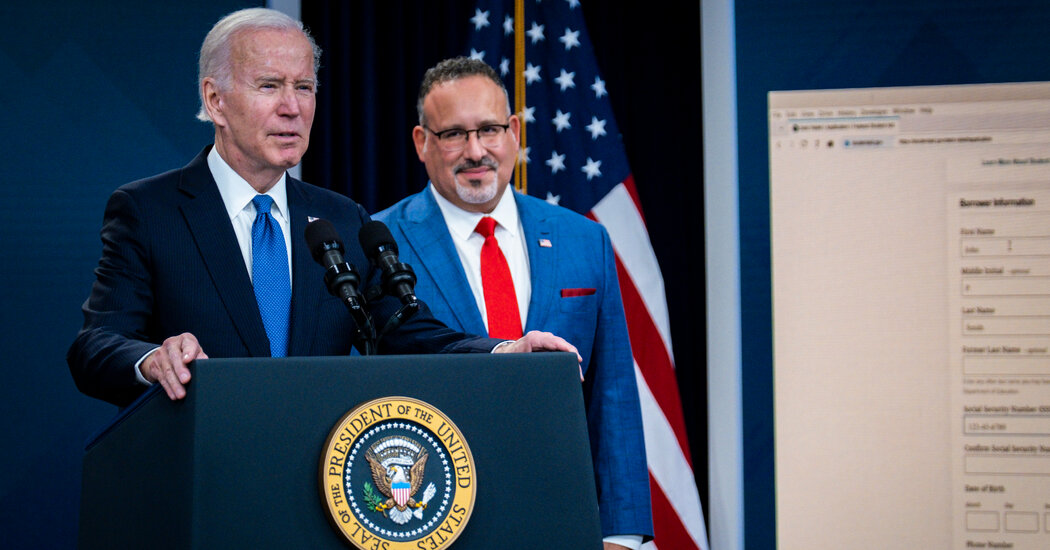The Biden administration issued new rules on Friday cementing protections for L.G.B.T.Q. students under federal law and updating the procedure schools must follow when investigating and adjudicating cases of alleged sexual misconduct on campus.
The new rules, which take effect on Aug. 1, effectively broadened the scope of Title IX, the 1972 law prohibiting sex discrimination in educational programs that receive federal funding. They extend the law’s reach to prohibit discrimination and harassment based on sexual orientation and gender identity.
“These regulations make it crystal clear that everyone can access schools that are safe, welcoming and that respect their rights,” Miguel A. Cardona, the education secretary, said in a call with reporters on Thursday.
Through the new regulations, the administration moved to include students in its interpretation of Bostock v. Clayton County, the landmark 2020 Supreme Court case in which the court ruled that the Civil Rights Act of 1964 protects gay and transgender workers from workplace discrimination. And the administration took steps to roll back some of the more rigid campus sexual assault policies issued during the Trump administration, which drew condemnation from Democrats, including Mr. Biden, for being overly deferential to students accused of sexual violence.
The rules deliver on a key campaign promise for Mr. Biden, who has faced pressure from Democrats and civil rights leaders to release them. They come as he tries to galvanize groups such as women who have lost abortion access and Black and progressive voters who have expressed disappointment with the president’s civil rights record.
While the new rules are expected to restore protections for accusers and expand the set of harassment complaints that schools are required to investigate, they are far from the sweeping rollback of Trump-era rules that was anticipated.
During a call with reporters ahead of the announcement, Jennifer Klein, the director of the White House Gender Policy Council, said the rules were designed to strike a balance. She added that the new rules would “restore and strengthen vital protections that were weakened by the prior administration, while reaffirming our longstanding commitment to fundamental fairness.”
While the regulations released on Friday contained considerably stronger protections for L.G.B.T.Q. students, the administration steered clear of the lightning-rod issue of whether transgender students should be able to play on school sports teams corresponding to their gender identity. The administration reiterated that while exclusion from an activity based on gender identity causes harm, the new rule does not extend to single-sex living facilities or sports teams. The Education Department has proposed a second rule dealing with eligibility for sports teams.
More than 20 states have passed laws that broadly prohibit anyone assigned male at birth from playing on girls’ and women’s sports teams or participating in scholastic athletic programs. Last year, House Republicans also passed a bill to enforce those prohibitions nationwide, though the bill was not taken up by the Democratic-controlled Senate.
The changes concluded a three-year process and helped fulfill a campaign promise President Biden made while running in 2020, when he to pledged to undo regulations set under Mr. Trump’s education secretary, Betsy DeVos, that he said served only to “shame and silence survivors” of sexual violence.
The DeVos-era rules, which took effect in 2020, were the first time that sexual assault provisions were codified under Title IX. They bolstered due process rights of accused students, relieved schools of some legal liabilities, laid out rigid parameters for impartial investigations and required schools to conduct courtroomlike proceedings.
They represented a sharp departure from the Obama administration’s interpretation of the law, which had input from Mr. Biden, who was then vice president. The administration issued unenforceable “Dear Colleague” letters directing federally funded schools to ramp up investigations into sexual assault complaints under the threat of funding penalties.
The Obama-era guidelines were hailed by civil rights advocates as having shepherded in a new era of accountability in addressing campus sexual misconduct, but they drew outcry from conservatives and civil liberties groups who felt they infringed on due process rights. They also received complaints from schools that said they felt pressured to tip the scale in accusers’ favor. Scores of students who had been accused of sexual assault went on to win court cases against their colleges for violating their rights under the Obama guidelines.
The Obama administration also issued a letter to states saying that transgender students were protected under Title IX, including the ability to use bathrooms that corresponded with their gender identity.
The Trump administration immediately rescinded that guidance, and asserted that transgender students were not covered under the federal law. The administration issued a memo after the Bostock ruling maintaining that position.
Upon taking office, Mr. Biden ordered the Education Department to review those policies, in part to address what many schools saw as an overcorrection by the Trump administration that gave excessive protections to students accused of sexual assault and discouraged victims from reporting instances of sexual violence and harassment.
Catherine E. Lhamon, the head of the department’s Office for Civil Rights, called the new rules the “most comprehensive coverage under Title IX since the regulations were first promulgated in 1975.”
They largely provide more flexibility in how schools conduct investigations, adding something advocates and schools had lobbied for. They retain key provisions that Ms. DeVos instituted to bolster due process for accused students as well as “supportive measures” for victims. The department, however, said it would hold schools to a higher standard when determining whether they had properly handled cases than what it called the “deliberately indifferent” standard under the current rules.
“The final regulations reaffirm our core commitment to fundamental fairness for all parties who exercise their Title IX rights because a fair process will help ensure that investigations lead to accurate and reliable and effective resolutions of sex discrimination complaints,” Mr. Cardona said.
The new rules address the parts of the DeVos-era regulations that most alarmed victims’ rights advocates. Among the most anticipated changes was the undoing of a provision that required hearings in which students accused of sexual misconduct, and even their family members or classmates, could cross-examine accusers in person.
The new rules allow for in-person hearings, but do not require them. They also mandate a “process enabling the decision maker to assess a party’s or witness’s credibility when credibility is in dispute and relevant,” including posing questions from the opposing party, according to a fact sheet issued by the Education Department.
While it reviewed the DeVos-era regulations, the Biden administration released guidance to schools in 2021 about how to navigate their requirements under the law. The previous rules have stayed in effect for the past three years while the administration sifted through more than 240,000 public comments as part of the rule-making process.
The drawn-out process has been a source of frustration for Democrats, victims’ rights advocates and students who have grown impatient for follow-through on the president’s promises.
“The impact of leaving these regulations in place for so long is we’ve seen a really negative impact on the culture in schools around Title IX and around reporting,” said Emma Grasso Levine, a senior manager at Advocates for Youth, an advocacy group that focuses on sexual violence.
“Many students that used to have faith in the Title IX process these days will say, ‘No, I don’t think you should report,’ because it’s too brutal, it’s too costly in terms of the negative emotional impact,” she said.
Title IX was designed to end discrimination based on sex in educational programs or activities at all institutions receiving federal financial assistance, beginning with sports programs and other spaces previously dominated by male students.
The effects of the original law have been pronounced. Far beyond the effects on school programs like sports teams, many educators credit Title IX with setting the stage for today’s academic parity today; female college students routinely outnumber males on campus and have become more likely than men of the same age to graduate with a four-year degree.
But since its inception, Title IX has also become the vehicle through which past administrations have delivered guidance to schools governing how they should respond to problems such as sexual violence and harassment on campus as well as discrimination against L.G.B.T.Q. students.
“One of the things that’s interesting about Title IX is how, with its original goals, how fully it succeeded, more so than any other civil rights law,” said R. Shep Melnick, a professor of American politics at Boston College. “And suddenly, the focus changed from ‘what were the opportunities within the educational institutions’ to ‘how are we going to change how people think about sex, gender, and generally how we’re going to undo stereotypes.’”



